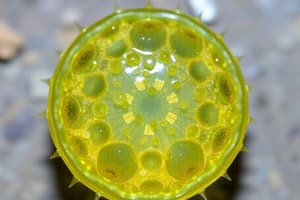Podcast
Questions and Answers
What is the characteristic of the pigment system of Chrysophyceae?
What is the characteristic of the pigment system of Chrysophyceae?
- Composed of chlorophyll A only
- Composed of chlorophyll A and C and large amounts of carotenoids and xanthophylls (correct)
- Composed of chlorophyll A and B
- Composed of chlorophyll A and D and large amounts of chlorophylls
What is the primary component of the cell wall of Chrysophyceae?
What is the primary component of the cell wall of Chrysophyceae?
- Lignin
- Cellulose (correct)
- Pectin
- Chitin
What is the morphology of Chrysophyceae cell walls in many genera?
What is the morphology of Chrysophyceae cell walls in many genera?
- Composed of a single layer with a U-shape
- Composed of two overlapping parts each having a V-shape
- Composed of two overlapping parts each having an H-shape (correct)
- Composed of a single layer with a spiral shape
What is the characteristic of motile forms of Chrysophyceae?
What is the characteristic of motile forms of Chrysophyceae?
What is the characteristic of simple zoospores of Chrysophyceae?
What is the characteristic of simple zoospores of Chrysophyceae?
What is the characteristic of the alga Vaucheria?
What is the characteristic of the alga Vaucheria?
During cell division in diatoms, what happens to the old wall of each newly formed cell?
During cell division in diatoms, what happens to the old wall of each newly formed cell?
What is the result of repeated cell divisions in diatoms?
What is the result of repeated cell divisions in diatoms?
What was the previously held view of auxospore formation?
What was the previously held view of auxospore formation?
What happens to the diploid nucleus during conjugation in diatoms?
What happens to the diploid nucleus during conjugation in diatoms?
What is the type of sexual reproduction in centric diatoms?
What is the type of sexual reproduction in centric diatoms?
What is the result of fertilization in diatoms?
What is the result of fertilization in diatoms?
What is the function of the oogonial female cell in diatoms?
What is the function of the oogonial female cell in diatoms?
When does cell division usually take place in diatoms?
When does cell division usually take place in diatoms?
What is the characteristic feature of the coenocytic structure of filaments in Vaucheria?
What is the characteristic feature of the coenocytic structure of filaments in Vaucheria?
How does Vaucheria reproduce vegetatively?
How does Vaucheria reproduce vegetatively?
What is the structure in which zoospores are formed in Vaucheria?
What is the structure in which zoospores are formed in Vaucheria?
What is the characteristic feature of a compound zoospore in Vaucheria?
What is the characteristic feature of a compound zoospore in Vaucheria?
What is the process by which the ovum is fertilized in Vaucheria?
What is the process by which the ovum is fertilized in Vaucheria?
What is the common feature of members of Bacillariophyceae?
What is the common feature of members of Bacillariophyceae?
What is the structure in which antheridia are formed in Vaucheria?
What is the structure in which antheridia are formed in Vaucheria?
What is the result of fertilization in Vaucheria?
What is the result of fertilization in Vaucheria?
What is a characteristic of an auxospore?
What is a characteristic of an auxospore?
What is a primary food source for aquatic animals, including fish and whales?
What is a primary food source for aquatic animals, including fish and whales?
What is the main pigment system that dominates diatoms?
What is the main pigment system that dominates diatoms?
In what industrial application are diatoms used?
In what industrial application are diatoms used?
In biology, what is the significance of diatom cell walls?
In biology, what is the significance of diatom cell walls?
What are the three main components of the reserve food materials in diatoms?
What are the three main components of the reserve food materials in diatoms?
What is a proposed origin of petroleum?
What is a proposed origin of petroleum?
What is the chemical composition of the cell wall in diatoms?
What is the chemical composition of the cell wall in diatoms?
What is the number of flagella present in motile gametes of diatoms?
What is the number of flagella present in motile gametes of diatoms?
What is a use of diatoms in cosmetics?
What is a use of diatoms in cosmetics?
What is the ploidy of diatoms during their vegetative phase?
What is the ploidy of diatoms during their vegetative phase?
What is the term for the rigid cell wall of diatoms?
What is the term for the rigid cell wall of diatoms?
What is the term for the area where the two valves of the frustule overlap?
What is the term for the area where the two valves of the frustule overlap?
What is the classification of diatoms based on their shape and arrangement of valves?
What is the classification of diatoms based on their shape and arrangement of valves?
Flashcards are hidden until you start studying
Study Notes
Division V: Chrysopyhta
- Characterized by a wide range of differentiation in various basic taxonomic features, leading some authors to treat some of its six classes as separate divisions.
Class I: Chrysophyceae
- Pigment system composed of chlorophyll A and C, and large amounts of carotenoids and xanthophylls, giving a yellow-green appearance.
- Reserve food material is Chrysolaminarine, oil, and fats.
- Cell wall is composed mainly of cellulose, with two overlapping H-shaped parts in many genera.
- Algae can be unicellular, filamentous, or siphonious, with motile forms having two unequal flagella.
- Asexual reproduction occurs through the formation of zoospores (simple or compound), with sexual reproduction being isogamous, anisogamous, or oogamous.
Order: Vaucheriales, Family: Vaucheriaceae, Genus: Vaucheria
- Siphonous branched alga that inhabits freshwater, marine, and soil habitats.
- Coenocytic structure of filaments, with septa absent except those separating reproductive structures from the main filaments.
- Vegetative reproduction occurs through fragmentation, while asexual reproduction occurs through zoospores formed in zoosporangia.
- Sexual reproduction involves the production of antheridia and oogonia, with fertilization of the ovum and subsequent formation of a zygote.
Class II: Bacillariophyceae
- Unicellular or colonial forms, with a pigment system dominated by carotenes and xanthophylls, giving a golden brown color.
- Reserve food material is Chrysolaminarine, oil, and fats.
- Cell wall is chemically composed of silicon, with motile gametes having a single anterior flagellum.
- Diatoms are diploid in their vegetative phase, with meiosis occurring during gamete formation.
- The rigid cell wall, known as frustules, is composed of two overlapping halves (epitheca and hypotheca) with a girdle area.
- Some pennate diatoms have a fissure known as a raphe, which extends from a central nodule to polar nodules.
- Frustules have markings used in taxonomy.
Habit and Occurrence
- Diatoms are abundant in all waters, both fresh and marine, and form an important element of the plankton flora.
- They are also found in damp soil, rocky walls, dry cliffs, and bark of trees, with some species occurring in hot springs and as epiphytes.
- Many diatoms occur as fossils, forming large deposits known as diatomaceous earth.
Reproduction
- Cell division involves an increase in volume of the frustule, followed by nuclear division, protoplast division, and the formation of two new cells with one old and one new half wall.
- Auxospore formation occurs through sexual reproduction, involving the conjugation of two cells, reductional division, and the formation of gametes, which then unite to form a zygote.
- The zygote elongates into an auxospore, which restores the original size of the diatom.
Economic Importance
- As food: Diatoms are abundant in water and form the food chain of aquatic animals.
- As industrial or commercial value: Diatoms are used in filters, metal polishes, dynamite, insulation, glass, porcelain, paints, toothpaste, and face powder.
- In biology: Diatoms are used to test the efficacy of microscopes, and their cell walls are used to examine the liver oil of fish.
Studying That Suits You
Use AI to generate personalized quizzes and flashcards to suit your learning preferences.




